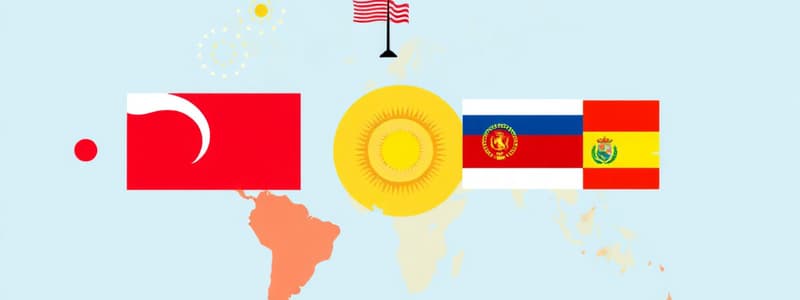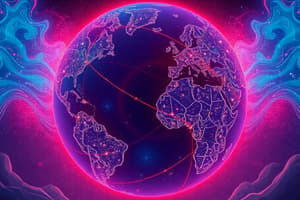Podcast
Questions and Answers
What is the main requirement for a group of people to be considered a nation?
What is the main requirement for a group of people to be considered a nation?
- A common religion among members
- A shared sense of belonging and oneness (correct)
- A central government authority
- A defined geographic territory
Which of the following is NOT an element of a state?
Which of the following is NOT an element of a state?
- Definite territory
- A politically organized body of people
- A shared language (correct)
- Sovereignty
Which of the following organizations was established on August 8, 1967?
Which of the following organizations was established on August 8, 1967?
- United Nations
- NATO
- African Union
- ASEAN (correct)
What is the primary focus of ASEAN according to the content provided?
What is the primary focus of ASEAN according to the content provided?
Which statement best describes a 'nation-state'?
Which statement best describes a 'nation-state'?
What is ONE of the defining characteristics of a state?
What is ONE of the defining characteristics of a state?
Which group was involved in the founding of ASEAN?
Which group was involved in the founding of ASEAN?
What does 'imagined community' refer to in the context of a nation?
What does 'imagined community' refer to in the context of a nation?
What distinguishes international relations from globalization?
What distinguishes international relations from globalization?
Which of the following is NOT a reason to study international relations?
Which of the following is NOT a reason to study international relations?
What is one of the main functions of embassies?
What is one of the main functions of embassies?
Which statement best represents the concept of state sovereignty?
Which statement best represents the concept of state sovereignty?
According to international relations, what role do international organizations play?
According to international relations, what role do international organizations play?
What is a key benefit of cooperation among nations in international relations?
What is a key benefit of cooperation among nations in international relations?
Which entity is primarily responsible for managing disputes between nations?
Which entity is primarily responsible for managing disputes between nations?
What aspect of globalization is highlighted by the concept of internationalization?
What aspect of globalization is highlighted by the concept of internationalization?
What was the primary focus of the Washington Consensus?
What was the primary focus of the Washington Consensus?
Which trade route first connected the Americas directly to Asian trading?
Which trade route first connected the Americas directly to Asian trading?
What characterized mercantilism in global trade?
What characterized mercantilism in global trade?
What is the implication of tariffs in international trade?
What is the implication of tariffs in international trade?
What led to the Global Financial Crisis of 2008-2009?
What led to the Global Financial Crisis of 2008-2009?
Which statement best reflects the relationship between economics and globalization?
Which statement best reflects the relationship between economics and globalization?
What is a defining characteristic of fiat currencies?
What is a defining characteristic of fiat currencies?
What is the significance of international economic integration?
What is the significance of international economic integration?
What was the primary purpose for the establishment of the UN?
What was the primary purpose for the establishment of the UN?
When was the WTO formed?
When was the WTO formed?
Which of the following countries is NOT part of the UN G5?
Which of the following countries is NOT part of the UN G5?
What does the WTO oversee?
What does the WTO oversee?
What major historical event led to the creation of the UN?
What major historical event led to the creation of the UN?
What is one of the functions of the UN as described in the content?
What is one of the functions of the UN as described in the content?
Which organization succeeded the General Agreement on Tariffs and Trade (GATT)?
Which organization succeeded the General Agreement on Tariffs and Trade (GATT)?
Which of the following best describes the UN G5?
Which of the following best describes the UN G5?
What was a significant economic consequence countries faced after World War I?
What was a significant economic consequence countries faced after World War I?
Stagflation is characterized by which two economic conditions occurring simultaneously?
Stagflation is characterized by which two economic conditions occurring simultaneously?
Which of the following institutions is NOT categorized as an international financial organization?
Which of the following institutions is NOT categorized as an international financial organization?
What global event did the Great Depression primarily affect in the 1920s?
What global event did the Great Depression primarily affect in the 1920s?
Which of the following is NOT a type of international financial institution mentioned?
Which of the following is NOT a type of international financial institution mentioned?
Flashcards are hidden until you start studying
Study Notes
Nation and State
- A nation is a group of people with a shared sense of identity and belonging, often based on common factors like ethnicity, language, or religion.
- A nation-state is a political community that emerges from civil society to enact peace legitimately.
- A state is a politically organized body of people, usually occupying a defined territory, possessing sovereignty.
- The four elements of a state are people, territory, government, and sovereignty.
Global Governance
- Global governance refers to the interplay of power between and among nation-states.
- International organizations (IOs) are institutions or entities that govern the interplay of power between and among nation-states.
International Organizations
- ASEAN (Association of Southeast Asian Nations) was founded in 1967 to promote political and economic cooperation among Southeast Asian countries.
- UN (United Nations) was established in 1945 after World War II to promote international cooperation and prevent future conflicts.
- UN G5 (United Nations Group of Five) is a grouping of five prominent UN member countries (Brazil, Germany, India, Japan, and the United States) advocating for reforms in the UN Security Council.
- WTO (World Trade Organization) was formed in 1995 as a successor to the General Agreement on Tariffs and Trade (GATT) to provide a framework for international trade.
Internationalization
- Internationalization refers to the deepening of interactions between states. It is a facet of globalization.
- It is important to study international relations for several reasons:
- Promotes successful trade policies between nations.
- Encourages travel related to business, tourism, and migration.
- Allows nations to cooperate, pool resources, and share information to address global issues.
- Advances human culture through cultural exchanges, diplomacy, and policy development.
Embassies and Their Functions
- Embassies serve several functions in international relations:
- Diplomatic Representation: Representing their home countries in the host nation.
- Consular Services: Providing assistance to citizens of their home country residing in the host nation.
- Trade and Investment Promotion: Facilitating trade and investment between their home country and the host nation.
- Cultural Exchange: Promoting cultural understanding and exchange between their home country and the host nation.
Historical Trade Networks
- Silk Road: A network of ancient trade routes connecting China, the Middle East, and Europe. While it facilitated international trade, it was not considered global.
- Galleon Trade: Connected Manila and Acapulco in 1571, marking the first direct connection between the Americas and Asian trade routes.
Economic Globalization
- Mercantilism: A system of global trade with restrictions, primarily imposed by monarchies.
- Tariffs: Taxes or duties imposed on imports or exports.
- Gold Standard: A monetary system where currencies are backed by gold.
- Fiat Currencies: Currencies not backed by precious metals, whose value is determined by their cost relative to other currencies.
- The Great Depression (1920s - 1930s): A global economic crisis triggered by various factors, including the abandonment of the gold standard by many countries.
- Stagflation: A period of economic stagnation and high inflation.
- Washington Consensus: An economic strategy aimed at reducing government spending and promoting privatization.
- Global Financial Crisis (2008-2009): A global economic crisis caused by the removal of banking and investment restrictions in the United States.
Conclusion
- International economic integration is a critical aspect of globalization.
- Economics provides a window into the phenomenon but does not encompass it entirely.
- International policymakers should strive for fair trading deals to enhance economic cooperation and balance.
Market Integration
- International Financial Institutions (IFIs) play a significant role in global economic integration.
- Types of IFIs:
- Intergovernmental:
- International Monetary Fund (IMF)
- World Bank (International Bank for Reconstruction and Development; International Development Association)
- Asian Development Bank
- Multilateral:
- International Finance Corporation (IFC)
- Multilateral Investment Guarantee Agency (MIGA)
- International Center for Settlement and Investment Disputes (ICSID)
- Intergovernmental:
State Sovereignty vs. International Law
- Sovereignty: Supreme power of the state to command and enforce obedience within its jurisdiction, free from foreign control.
- Internal Sovereignty: State's power to rule within its territory.
- External Sovereignty: State's freedom from foreign control.
- International Law: A system of rules and principles governing relations between states.
- The concept of state sovereignty faces challenges in the context of international law.
- While states retain sovereignty within their borders, they are also subject to international law and obligations.
Permanent Court of Arbitration (PCA)
- The PCA is an intergovernmental organization that provides dispute resolution services to states and other parties.
UN Security Council
- The UN Security Council is composed of 15 members, including five permanent members (China, France, Russia, the United Kingdom, and the United States).
- The permanent members have veto power, meaning they can block any resolution.
- The Security Council is responsible for maintaining international peace and security.
Studying That Suits You
Use AI to generate personalized quizzes and flashcards to suit your learning preferences.



